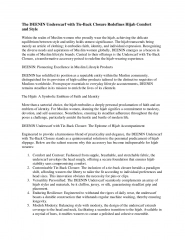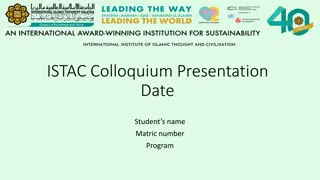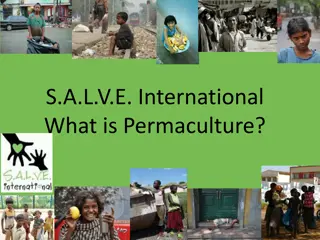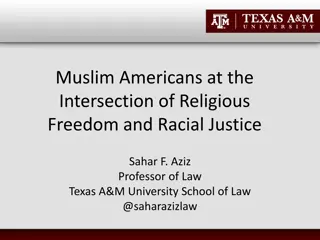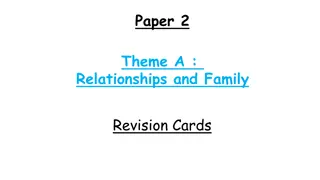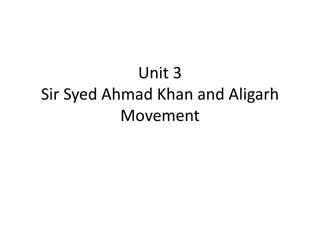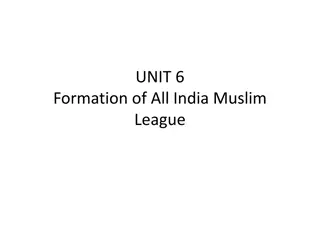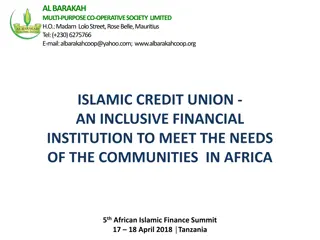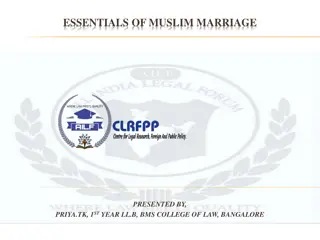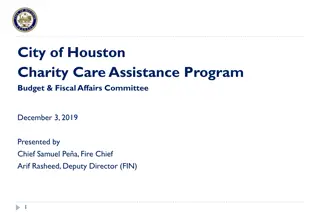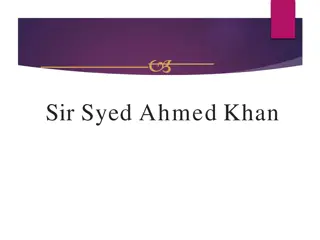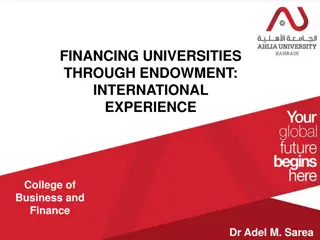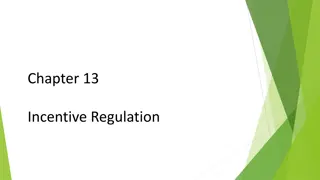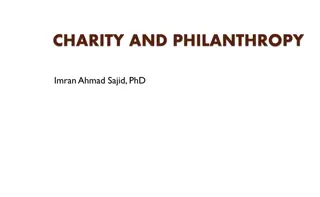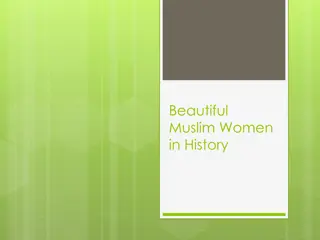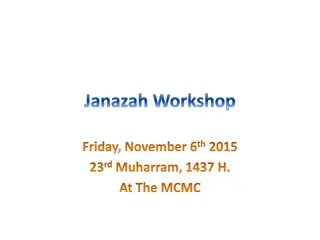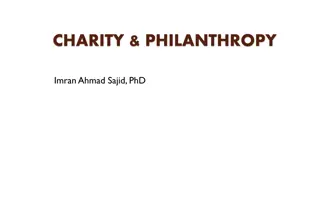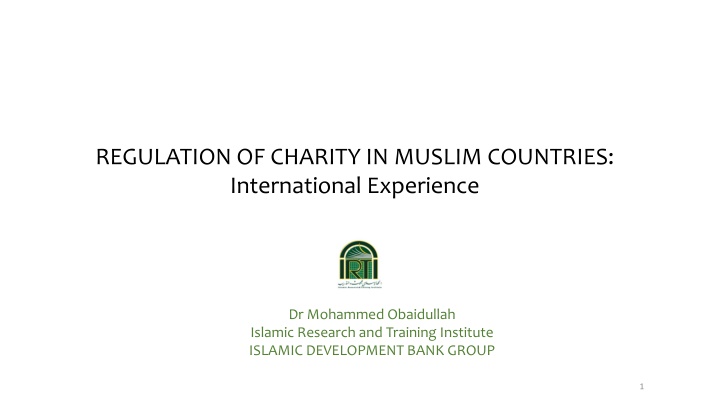
Regulation of Charity in Muslim Countries: Insights and Comparisons
Explore the regulatory frameworks and trends related to charity, Zakat, and Waqf in Muslim-majority countries, including Southeast Asia, South Asia, and Sub-Saharan Africa. Learn about the nature of Zakat obligation, trends in charity mobilization, and the incentivization of Zakat payments. Gain insights from international experiences and comparative analyses.
Download Presentation

Please find below an Image/Link to download the presentation.
The content on the website is provided AS IS for your information and personal use only. It may not be sold, licensed, or shared on other websites without obtaining consent from the author. If you encounter any issues during the download, it is possible that the publisher has removed the file from their server.
You are allowed to download the files provided on this website for personal or commercial use, subject to the condition that they are used lawfully. All files are the property of their respective owners.
The content on the website is provided AS IS for your information and personal use only. It may not be sold, licensed, or shared on other websites without obtaining consent from the author.
E N D
Presentation Transcript
REGULATION OF CHARITY IN MUSLIM COUNTRIES: International Experience Dr Mohammed Obaidullah Islamic Research and Training Institute ISLAMIC DEVELOPMENT BANK GROUP 1
Comparative Analysis of Zakat & Waqf Laws Studies cover the following countries: South-East Asia Malaysia, Indonesia, Singapore, Brunei Darussalam South Asia India, Pakistan, Bangladesh Sub-Saharan Africa Sudan, Nigeria, Kenya, Tanzania (Zanzibar), Mauritius, South Africa 2
Charity in Islam Forms of charity in Islam: Sadaqa, Zakah, Waqf; broad term for charity in Islam is sadaqa. When compulsorily mandated on an eligible Muslim, sadaqa is called zakah. Shariah rules define the nature of who are liable to pay zakah, at what rate zakah must be paid and who can benefit from zakah. When sadaqa is made in a manner that benefits continue to flow over future time periods, it is called sadaqa jariya, or waqf. Waqf involves holding or setting aside certain assets by the donor and preserving it so that benefits continuously flow to a specified group of beneficiaries or community. 3
Charity Trends in Some Muslim Countries Zakat mobilized increased by over 32 times over 10 yearsin Indonesia. Zakat mobilized increased by 40 percent (as collected by Government agency) over 3 years in Pakistan. Zakat mobilized increased by 20.2 percent over 3 years in Singapore. Zakat mobilized increased by 7 times over last 12 years and 37 times over 22 yearsin Malaysia. Zakat mobilized increased by 4.8 times over last 9 years in Sudan. The country to lead in waqf development (maximize revenues from waqf assets) is Singapore followed by Malaysia, Sudan and Indonesia 4
Nature of Zakat Obligation Zakat is either compulsory (#1) or voluntary (#2) in a given jurisdiction. Zakat is compulsory in all the provinces in Malaysia, Sudan and Pakistan. It is voluntary in Indonesia, Singapore, Brunei Darussalam, India, Bangladesh, Kenya and South Africa,. In Nigeria, of the 9 provinces, Bauchi, Zamfara, Niger and Jigawa States have made zakat payment compulsory, while Kano, Katsina, Borno, Yobe and Kebbi states make zakat payment a voluntary act. 5
Incentivize Zakat Payment If zakat payment is compulsory, then #11. There must be strong deterrents against non-payment #111. Law may prescribe physical and/or financial penalty against non- payment (e.g. in Malaysia, marked by reluctance to enforce in a population with great religious and cultural diversity) #112. Law may provide for forced recovery of due and unpaid zakat (e.g. in Sudan) Example of ineffective deterrent in Pakistan: possibility to avoid by declaring belief in different school of Shariah law 6
Incentivize Zakat Payment #12. State should incentivize zakat payment through tax benefits #121. State should permit deduction of zakat paid from taxable earnings (e.g. in Sudan and Pakistan) #122. State should permit deduction of zakat paid from tax payable (e.g. in Malaysia) 7
Infrastructure #132. Agency must be empowered to enforce zakat collection #1321. Agency must be empowered to seek any information from any individual or entity for determination of zakat liabilities of zakat-payers #1322. Agency must be empowered to demand any kind of assistance from other state agencies that is deemed necessary for effective zakat collection #1323. Agency must be empowered to punish unauthorized collection #133. Agency must be empowered to enforce zakat distribution #1331.Agency must be empowered to punish unauthorized payment In Malaysia the State Islamic Religious Councils under the Sultans are fully responsible but lack the teeth of enforceability. In Pakistan both public and private institutional as well as individual collectors are permitted. In Sudan, Diwan under government is fully responsible and exercises much of the above. 8
Infrastructure #134. Rules and criteria for membership and executive positions in the apex agency should be in place #135. A Shariah body should be constituted for advising the Agency in matters that require formulation of new regulations and rules and that have Shariah implications #136. Financial provision should be made for Agency to cover its expenditure #1361. State should provide finance to cover operational expenditure of the apex zakat body #1362. Zakat body should be permitted to use part of zakat collected (subject to a cap) to absorb operational expenditure #137. There should be provision of appeal by muzakki against a wrong decision by Agency officials Above exists only in Sudanese laws. 9
Zakat Collection Rules #14. Agency prescribes how to estimate zakat liability for individuals and businesses #141. Agency stipulates general conditions relating to zakatability, e.g. hawl #1411. Agency defines the zakatable assets/ output/ earnings #1412. Agency defines assets/ output/ earnings exempt from zakat #142. Agency stipulates methods of estimation of zakat base and applicable rates of levy #143. Agency should be empowered to modify the list of zakatable assets, the conditions and methods of zakat estimation from time to time. Above exist only in Sudanese laws. Pakistani law defines zakatable assets and estimation method for financial assets only. 10
Zakat Distribution Rules #15. Agency must distribute zakat among asnaf in conformity with Shariah #151. Agency should define the asnaf and prescribe methods to determine the same #152. Muzakki may be permitted to retain a part of zakat for self-distribution #153. Agency may decide on a priority scheme for distribution of zakat among asnaf #154. Agency should seek distribution of all zakat collected during the same lunar year and avoid carrying undistributed surplus Above exist only in Sudanese laws. 11
Accountability, Transparency and Governance #16. Agency should adhere to highest standards of accountability, transparency and good governance #161. Agency should ensure separation of zakat funds from other forms of charity funds collected #162. Agency should place the funds in safe and liquid avenues #163. Agency should share information about zakat collection and utilization with the public with utmost transparency and in a spirit of sharing on a continuous basis #1631. Agency should be open to suggestions from the community regarding zakat management Above exist only in Sudanese laws. 12
Accountability, Transparency and Governance #164. There should be strong deterrent in the form of financial penalty and/or physical punishments for dereliction of duty, fraud, dishonesty on the part of zakat officials #1641. There should be strict deterrent in the form of financial penalty and/or physical punishments against fraud, dishonesty and misappropriation of zakat funds #1642. There should be strict deterrent in the form of financial penalty and/or physical punishments against Shariah non-compliance Above exist in Sudanese and Malaysian laws (seldom enforced). 13
Incentivize Zakat Payment #2. If zakat payment is voluntary, then #21. State should incentivize zakat payment through tax benefits #211. State may permit deduction of zakat paid from taxable earnings Tax deductibility of zakat is permitted in Indonesia. Also permitted in India, South Africa but only as voluntary donations as there is no zakat law. 14
Infrastructure #22. There must be an apex body for zakat management in the country, which may be (i) a state agency or (ii) an association/ committee of voluntary institutions #221. The apex body must be empowered to set regulations/ guidelines for zakat management #222. The apex body should (i) include Shariah scholars, or (ii) put in place a Shariah body for advising on zakat matters that have Shariah implications arising from time to time BAZNAS in Indonesia, MUIS in Singapore No formal bodies in India and South Africa 15
Infrastructure #223. Rules and criteria for membership and executive positions in apex zakat body should be in place #224. Adequate provision of finance to cover operational expenditure of the apex zakat body should be in place (i) through budgetary allocation and/or (ii) through contribution of a part of zakat collected by the zakat institutions towards covering its operational expenditure. Indonesian law provides the above in detail for the apex body BAZNAS. 16
Zakat Collection Rules #23. The apex zakat body in consultation with Shariah scholars and other stakeholders (e.g. professional bodies in accounting, financial planning, inland revenue authorities, and community leaders) should formulate guidelines for estimation of zakat liability of individuals and businesses. #231. Zakat institution (ZIs) should advise and assist the zakat-payer in estimating their zakat liabilities in conformity with the guidelines #232. ZIs may appoint agents for collection of zakat against payment of commission #233. ZIs may undertake zakat mobilization campaigns and use other solicitation mechanisms for creating awareness about zakat BAZNAS competes with Indonesian NGOs for zakat collection and distribution 17
Zakat Distribution Rules #24. ZIs must distribute zakat among asnaf in conformity with Shariah #241. ZIs should follow the guidelines issued by the apex zakat body for definition of the asnaf and the methods for their determination. #242. ZIs may decide on a priority scheme for distribution of zakat among asnaf #243. ZIs should seek distribution of all zakat collected during the same lunar year and avoid carrying undistributed surplus #244. ZIs may be allowed to absorb part of zakat to cover their operational expenditure subject to a cap Indonesian laws provide for healthy completion between BAZNAS and NGOs 18
Accountability, Transparency and Governance #25. ZIs must adhere to highest standards of accountability, transparency and good governance #251. ZIs must ensure separation of zakat funds from other forms of charity funds collected #252. ZIs should place the funds, including undistributed surplus if any, in short- term safe and liquid schemes of Islamic financial institutions #253. ZIs must at regular intervals disclose the figures of zakat collection and utilization by them to the community with utmost transparency and in a spirit of sharing #254. ZIs must disclose the actual operational expenditure (including commission to agents, contribution to apex body) that is charged to zakat funds Above covered only in Indonesian law 19
Accountability, Transparency and Governance #255. There must be strict deterrent in the form of financial penalty and/or physical punishments for dereliction of duty, fraud, dishonesty on the part of zakat officials #2551. There must be strong deterrent in the form of financial penalty and/or physical punishments against fraud, dishonesty and misappropriation of zakat funds #2552. There must be strong deterrent in the form of financial penalty and/or physical punishments against Shariah non-compliance Above covered only in Indonesian law 20
Comparative Analysis of Waqf Laws Studies cover the following countries: South-East Asia Malaysia, Indonesia, Singapore, Brunei Darussalam South Asia India, Pakistan, Bangladesh Sub-Saharan Africa Sudan, Nigeria, Kenya, Tanzania (Zanzibar), Mauritius 21
Definitions Waqf law should provide a comprehensive definition of waqf that includes both permanent and temporary waqf. It must explicitly cover various types of waqf: family and social waqf, direct and investment waqf, cash waqf, corporate waqf. Except laws in Indonesia, Sudan and Nigeria, legal frameworks in most countries do not explicitly deal with cash and corporate waqf. Laws in Sudan and Mauritius include provisions regarding family waqf. 22
Creation of New Waqf Legal requirements that make the creation of new waqf more difficult, e.g. approval of the head of the state, are both unnecessary and undesirable. A simple process of registration with the regulatory body is both desirable and adequate. Creation of waqf in countries, e.g. Malaysia (Creation of Wakaf Khas), Zanzibar (Establishment of Masjids) require prior permission. 23
Creation of New Waqf The legal framework should actually encourage creation of new waqf by minimizing financial and non-financial costs of waqf creation and management. A major objective of the Diwan in Sudan is to carry out training and capacity building and institutional development in the field of waqf and encourage citizens to do waqf. In Zamfara state in Nigeria, the government agencies and contractors are required to endow a certain percentage of their total revenues as waqf thereby, ensuring the continuous enhancement of waqf corpus. 24
Creation of New Waqf Awqaf in general, have fallen behind common trusts and other forms organizing charitable and not-for-profit activities in terms of responding to evolving societal needs. Creation and management of waqf is a relatively more complex and demanding process and involves additional financial and non-financial costs. Incentivizing waqf in a manner similar to secular trusts and other forms of not-for-profit organizations, e.g. tax rebate on contributions for the donor/ endower would make the system both efficient and fair. 25
Creation of New Waqf Who may endow: Most laws restrict making a waqf to Muslim individuals. Kenyan law even restricts it further by using narratives, e.g. an Arab, a member of the Twelve Tribes, a Baluchi, a Somali, a Comoro Islander, a Malagasy or a native of Africa of the Muslim faith Indian law permits non-Muslims as long as the purpose of waqf is religious or charitable. Indonesian law explicitly provides for institutional waqif 26
Creation of New Waqf What may be Endowed The legal framework should not restrict the definition of the endowed asset to immovable tangible assets, such as, real estate, but should also explicitly recognize movable, financial and intangible assets, e.g. cash, stocks, bonds and financial securities, transportation vehicles, rights on land and building, rights of leasing, rights of intellectual property (e.g. law in Indonesia). Nigerian law permits waqf of all lawful items permitted by Shariah. In contrast, in Mauritius, the law requires that the subject of waqf may consist of any property other than things which are consumed by use. 27
Creation of New Waqf The institution of family waqf must be revived. Sudan and Mauritius provide some excellent examples of family awqaf. The law in Mauritius has a few interesting features: the possibility of restricting the benefits to one or two generations, how waqf benefits will be apportioned between children and descendants and other possible beneficiaries across generations, the conditions under which the benefits will lapse. 28
Waqf Management Preservation: Legal frameworks must clearly articulate the permanent nature of waqf arising from the principle of once a waqf, always a waqf . In case old laws fail to ensure protection, they must be replaced with new provisions that ensure this. Indian law explicitly prohibits the waqf asset from being used as a mortgage, confiscated, given away, sold, inherited, exchanged or being alienated into any form of right. 29
Waqf Management Recovery of lost awqaf: In case old laws fail to ensure protection, they must be replaced with new provisions that enable recovery of lost waqf assets. (e.g. in India) Sudanese law empowers the Diwan to recover all the endowed money which is possessed by other individuals, institutions, companies, or governmental authorities or to receive a just and equitable compensation from them; that excludes endowments from application of any superseding law and that applies the provisions of the evacuation of public buildings Act to endowments. 30
Preservation vs. Development While preservation is important, law must clearly recognize the importance of sustaining and enhancing the benefits flowing out of the waqf through development. An undue emphasis on preservation (e.g. constraints on leasing) would lead to neglect of developmental possibility with private participation. An undue emphasis on development, to the extent that it results in loss of full or partial ownership of asset to private developers) would dilute and vitiate the very concept of waqf. 31
Preservation vs. Development The regulatory framework must seek to strike a balance between concerns about preservation and development. Sudanese law seeks to strike a balance between preservation and development aspects by requiring the Diwan to undertake the maintenance and improvement of endowed funds and evaluation, construction and re- construction, and investment of funds in all legitimate investments. 32
Development of Waqf Asset The waqf asset may however be exchanged as an exception to the general rule of inalienbility, when this is deemed to be in public interest. Such exchange or istibdal would however, require prior permission from the regulator with additional conditions that the same is (i) necessary or beneficial to the waqf; (ii) consistent with the objects of the waqf; (iii) against another asset of equal or higher value; (iv) and with due respect to the inalienability of religious awqaf. The issue of istabdal is explicitly dealt with by the law in Sudan (also in Indonesia) where the Diwan is empowered to sell an endowed asset to replace it with a better ones only to the extent deemed absolutely necessary. 33
Development of Waqf Asset Laws vary in permitting the trustee to lease out the property for varying periods governed by considerations of preservation as well as development. There is a need to ensure balance. Caps on lease period are as low as one-to-five years in Zanzibar; three-to- nine years in Mauritius; three years in India (subsequently increased to ten- to-thirty years) and as high as ninety-nine years in Singapore. 34
Public vs. Private Management of Waqf Waqf is an institution originally and always meant to be in the voluntary sector with management of waqf entrusted to private parties. However, state has often sought to play a role in the ownership and management of awqaf, at times governed by motives to expropriate and at other times, by need to curb corrupt practices of private trustee-managers. Positive evidence that the state can play the role of an efficient manager of awqaf with examples of large-scale development of existing awqaf in public-private mode (Sudan, Singapore and Malaysia). Mixed evidence for public and private management in other countries. 35
Public vs. Private Management of Waqf Where waqf management is in private hands, law should clearly stipulate elaborate and clear eligibility criteria for a trustee-manager not only covering aspects of integrity and trust-worthiness but also professional competence. Given that the individual or institution so nominated meets the criteria, the regulator must respect the expressed intention the waqif. Laws must clearly articulate the responsibility of waqf management, that should not only emphasize preservation and protection of waqf assets, but also their development. The responsibility should also include transparent and honest reporting of financials. (Indonesia, India, Mauritius) 36
Private Management: Incentivize Law should adequately incentivize waqf management with clarity on remuneration (rewards) and punishment. In Indonesia as well as Mauritius, the remuneration to which a mutawalli/ nazir is entitled shall not exceed one tenthof theincome Financial penalties, especially when these are expressed in absolute numbers tend to lose their effectiveness as deterrents with time (e.g. in India, Mauritius). Physical punishments (as in Indonesia) are potentially more effective. 37
Investment of Waqf Assets Laws should explicitly deal with the issue of investment of waqf assets as investment can alone generate returns which may then be applied to the purpose for which the waqf has been created. Only the laws in Indonesia, Sudan and a few states in Nigeria include provisions relating to investments. Law may provide for risk minimization through diversification or avoidance of high risk investment avenues (e.g. in Indonesia). In contrast, Sudanese law empowers the Diwan to establish companies, partnerships for investment funds in partnership with any party capable as per the provisions of Islamic law. 38
Thank You Send comments and queries to mobaidullah@isdb.org For more on Islamic Social Finance visit my blog site www.sadaqa.in 39

